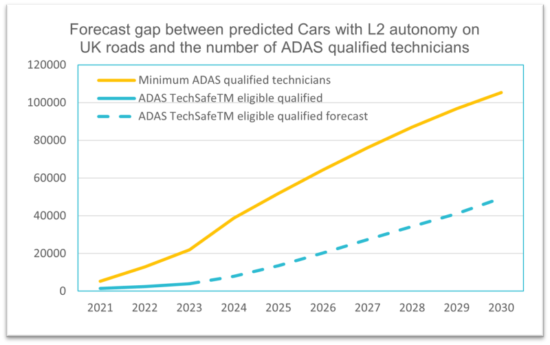IMI: ‘profound economic repercussions’ ahead if ADAS technician skill shortage not addressed
 (Chart: IMI)
(Chart: IMI)
Electric vehicles dominated discussions about future mobility in 2023, but the latest data from the Institute of the Motor Industry (IMI) suggests that a more urgent issue has been neglected in the rush to promote EVs. The latest IMI TechSafe Technician Forecasts data identifies what the institute calls a “dangerous shortfall” in technicians able to work safely and competently on vehicles equipped with Advanced Driver Assistance Systems (ADAS), with approximately 18,000 extra ADAS-qualified technicians required to meet demand.
The IMI estimates 10 per cent of cars on UK roads will feature Level 2 autonomy – that is to say features like automated lane centring and adaptive cruise control – by the end of 2023. The impact of European Union legislation mandating these features in all newly produced vehicles since July 2022 will mean the rapid proliferation of such cars; the IMI forecasts 44 per cent will have Level 2 autonomy by 2030. Therefore, the institute is calling for urgent action to address the already large shortfall in skilled technicians.
IMI CEO Steve Nash says the longer term target of readiness for electric vehicles may have distracted the sector and the government from addressing the more pressing need to upskill technicians for ADAS. “This technology is already present in vehicles on UK roads. But with only 3,500 technicians ADAS qualified there’s a real risk that repairs and recalibration is taking place without the proper skills – and that is a serious risk to road safety.”
The modern car necessitates a rapid evolution within the repair and maintenance sector, and a shortfall in garages with ADAS-qualified technicians and suitable equipment could have negative consequences for the safety of the country’s roads. ADAS needs to be repaired and recalibrated to ensure cars’ safety-critical features continue to function. With the apparent skills shortage in this segment, the IMI argues that aftermarket businesses are also missing out on the revenue potential.
“We understand that high vacancy rates and ongoing economic pressures are making investment in additional training more difficult for businesses,” Nash adds. “However, futureproofing the workforce is essential for continued profitability as well as road safety.”
ADAS technology focuses on increasing safety and convenience, without taking full control away from the driver. Systems such as lane assist, adaptive cruise control and self-parking allow the vehicle to control steering, acceleration and braking. Problems with the electronics, sensors and software within these vital systems could lead to serious safety breaches or even collisions, which could be highly dangerous at speed on a motorway. Proper maintenance and regular servicing are essential to keep drivers and other road users safe.
The increased use of Advanced Driver Assistance Systems (ADAS) is also a vital part of the journey towards fully autonomous vehicles which should make roads safer. However, if such complex technology is not supported correctly by a technician with the relevant and up to date training, it could instead lead to catastrophic collisions.
“Maintaining modern, high-tech vehicles is a matter of life and death, so a shortage of suitably trained technicians is nothing short of a crisis, particularly when you consider the government’s stated ambitions for autonomous vehicles,” concluded Nash. “It is imperative, therefore, that all relevant stakeholders – including government – acknowledge the profound economic and road safety repercussions of the prevailing skills gap. We need to work collaboratively to see more technicians gain the necessary qualifications to protect the industry and road users as we move towards an exciting future of autonomous driving.”
The IMI launched Level 2 and Level 3 ADAS qualifications in 2022. The IMI TechSafe recognition program provides independent assessment and recognition of the technical competence of technicians working in the UK automotive sector. IMI TechSafe identifies a member’s professionalism and safe working practice in the field of electric vehicles (EV) and other safety-critical vehicle systems such as Autonomous or Advanced Driver Assistance Systems (ADAS).
Download the IMI’s latest ADAS TechSafe Technician Forecasts briefing here.



Comments